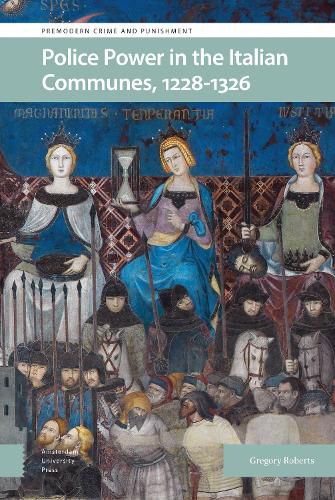Readings Newsletter
Become a Readings Member to make your shopping experience even easier.
Sign in or sign up for free!
You’re not far away from qualifying for FREE standard shipping within Australia
You’ve qualified for FREE standard shipping within Australia
The cart is loading…






Medieval states are widely assumed to have lacked police forces. Yet in the Italian city-republics, soldiers patrolled the streets daily in search of lawbreakers. Police Power in the Italian Communes, 1228-1326 is the first book to examine the emergence of urban policing in medieval Italy and its impact on city life. Focusing on Bologna in the thirteenth and early fourteenth centuries, Gregory Roberts shows how police forces gave teeth to the communes’ many statutes through a range of patrol activities. Whether seeking outlaws in the countryside or nighttime serenaders in the streets, urban police forces pursued lawbreakers energetically and effectively. They charged hundreds of individuals each year with arms-bearing, gambling, and curfew violations, convicting many of them in the process. Roberts draws on a trove of unpublished evidence from judicial archives, rich with witness testimony, to paint a vivid picture of policing in daily life and the capacity of urban governments to coerce. Breaking new ground in the study of violence, justice, and state formation in the Middle Ages, Police Power in the Italian Communes sheds fresh light on the question of how ostensibly modern institutions emerge from premodern social orders.
$9.00 standard shipping within Australia
FREE standard shipping within Australia for orders over $100.00
Express & International shipping calculated at checkout
Medieval states are widely assumed to have lacked police forces. Yet in the Italian city-republics, soldiers patrolled the streets daily in search of lawbreakers. Police Power in the Italian Communes, 1228-1326 is the first book to examine the emergence of urban policing in medieval Italy and its impact on city life. Focusing on Bologna in the thirteenth and early fourteenth centuries, Gregory Roberts shows how police forces gave teeth to the communes’ many statutes through a range of patrol activities. Whether seeking outlaws in the countryside or nighttime serenaders in the streets, urban police forces pursued lawbreakers energetically and effectively. They charged hundreds of individuals each year with arms-bearing, gambling, and curfew violations, convicting many of them in the process. Roberts draws on a trove of unpublished evidence from judicial archives, rich with witness testimony, to paint a vivid picture of policing in daily life and the capacity of urban governments to coerce. Breaking new ground in the study of violence, justice, and state formation in the Middle Ages, Police Power in the Italian Communes sheds fresh light on the question of how ostensibly modern institutions emerge from premodern social orders.